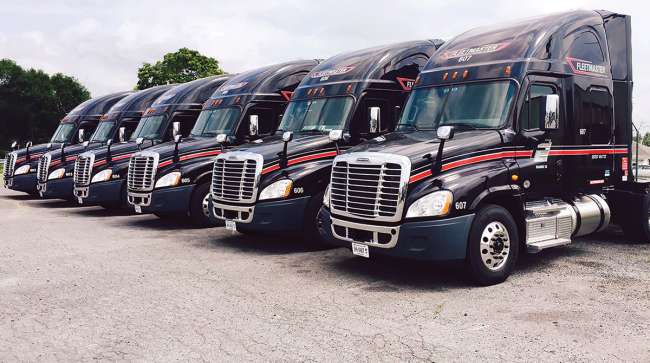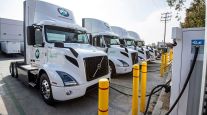Staff Reporter
Fleetmaster Works With Customer, OEMs to Add Electric Trucks

[Stay on top of transportation news: Get TTNews in your inbox.]
For Virginia-based Fleetmaster Express, transitioning to a greener fleet was compelled in part by a customer’s request and is advancing in concert with truck manufacturers.
One by one, the company is adding electric trucks as it replaces diesel-powered units.
“That is the plan for all of the trucks,” Fleetmaster Chief Operating Officer Travis Smith told Transport Topics on Aug. 31. “That’s our goal. You’ve got to start out with lofty goals and begin with the end in mind. And our goal is to create a better environment as we deploy these trucks.”
Pursuing cleaner transportation options is also a goal for aluminum packaging manufacturer Ball Corp., a Fleetmaster customer, Smith noted.

Smith
“They’ve been looking to us to partner with them and come up with a fully sustainable solution, meaning cutting out biofuel, creating a sustainable environment,” he said.
This is on top of efforts Fleetmaster has underway to add electric trucks to its fleet. “We have orders in with Tesla. We have orders in with Freightliner on their eCascadia. We have orders in with Volvo,” Smith said.
The company is already testing Volvo VNR electric units, Smith added. The companies conducted an engineering study to determine how best to integrate the trucks into the fleet. Based on shifts and run schedules, they determined that two diesel trucks could be replaced by two electric trucks at the onset. They also collaborated on installation of an on-site charging station, a setup that can charge trucks to 80% capacity in two hours. The trucks are operating out of Fleetmaster’s Fort Worth, Texas, location.
“We’ll be able to run two shifts around the clock with these trucks and completely replace diesel,” Smith said. “That’s over $50,000 a year in fuel savings per truck. So it’s a significant amount of fuel savings. Now, there is a cost with the electricity, but it’s substantially less.”
Smith added, “On a diesel unit you have between 50% and 60% efficiency from the fuel. With electric, you have over 90% efficiency. So there are huge efficiency gains in any energy used to charge the batteries. Ninety percent of that energy is going directly to the drivetrain of the truck.”
Fleetmaster expects to receive the trucks sometime by the end of the year, likely in late November or early December.
Fleetmaster tested the trucks earlier this year at Volvo’s Greensboro, N.C., location. It also discussed with the manufacturer details on the sustainability of the trucks’ manufacturing process, including that the batteries could be re-purposed or recycled.
Volvo has an engineering team that will examine the trucks’ test results, and Fleetmaster plans to conduct its own reviews as it angles to gradually build its electric fleet beyond these two trucks.

Fleet managers find that healthy, happy drivers are key to business success. Stephen Kane of Rolling Strong says driver health starts with “being vulnerable enough to listen to somebody that knows about health.” Hear a snippet above, and get the full program by going to RoadSigns.TTNews.com.
“We’ve got 10 trucks on order with Volvo,” Smith said. “We have two trucks on order with Freightliner, two trucks on order with Tesla and then we’ve got two trucks on order with Dana Inc., who are doing electric truck conversions for us on a couple of our spotter trucks. So by the end of next year, our target is to have a total of 18 units deployed in a local spotting and shuttle environment.”
Smith acknowledges the cost involved with deploying electric trucks, but believes the economics will work out over time.
“Right now the price point on an electric truck is higher than a diesel truck,” Smith said. “They’ll get closer and as that levels off, there’s a huge advantage. Depending on the customer and depending on the work schedule and the environment these trucks are running, there’s potentially a significant cost savings of 8% to 10%. And what does that mean? In a multimillion dollar operation, that’s a lot of money.”
Want more news? Listen to today's daily briefing below or go here for more info:




